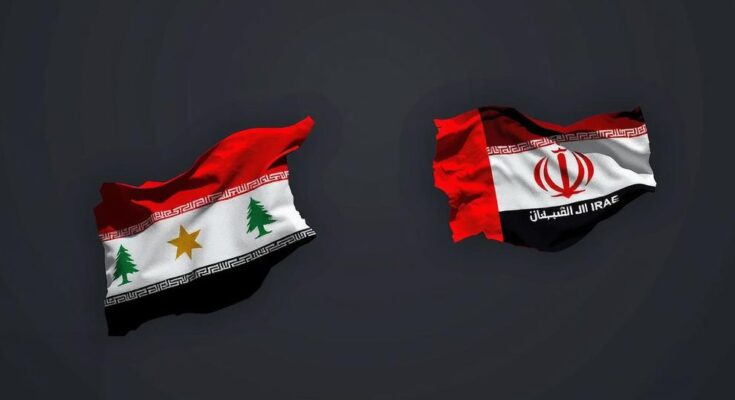The Syrian regime, facing territorial losses to opposition forces, has intensified diplomatic outreach to Iraq, Iran, and the UAE for support. Recent meetings highlight collaborative commitments against terrorism and reinforce Syria’s quest for stability and territorial integrity amidst a fragmented control landscape.
The Syrian regime, led by President Bashar al-Assad, is intensifying its diplomatic outreach as it confronts significant military challenges, marked by the recent loss of Aleppo to opposition forces. This shift is particularly strategic, as the regime currently maintains control over western Syria, while opposition factions dominate the north and east, underscoring a precarious territorial situation. In response, Assad has engaged with key regional players, including Russia, Iran, Iraq, and the United Arab Emirates (UAE).
On the diplomatic front, Assad’s recent communications reflected efforts to solidify alliances and bolster support against perceived threats from opposition groups. Following the start of the offensive led by Hayat Tahrir al-Sham on Aleppo, Iran’s foreign minister is expected to visit Syria, signifying a strengthening of relations. Furthermore, during discussions with Iraqi Prime Minister Mohammed Shia’ Al Sudani, both leaders reaffirmed their commitment to collaborating on counter-terrorism measures and maintaining Syria’s territorial integrity.
In a notable exchange with UAE’s Sheikh Mohammed bin Zayed Al Nahyan, President Assad reiterated Syria’s determination to restore stability and sovereignty despite intensified attacks by terrorist groups. The UAE has expressed its solidarity with Syria and support for its fight against extremism, highlighting a renewed commitment to a peaceful resolution of the ongoing crisis. This engagement underscores the shifting dynamics in regional alliances and the recognition among several Gulf states of the regime’s role in ensuring stability, even amidst current adversities.
The outreach signifies a broader reintegration strategy as Syria seeks to mend ties with the Gulf states and reestablish its legitimacy within the Arab League. With Aleppo’s recent upheaval showcasing the regime’s vulnerabilities, Assad requires robust support from Iraq and Gulf allies, as well as strategic assistance from Iran and Russia, to enhance his position in this increasingly complex regional conflict.
The Syrian civil war, which commenced in 2011, has resulted in widespread devastation and a complex geopolitical landscape. Various factions, including opposition groups backed by Turkey and the U.S., as well as Kurdish forces, control different regions within Syria. The Assad regime, largely recognized in western Syria, struggles against internal dissensions and external influences. Assad’s recent attempts to engage with neighboring countries reflect a strategic maneuver to reaffirm Syria’s sovereignty and regain influence amidst ongoing conflicts.
In summary, the Syrian regime’s diplomatic efforts towards Iraq, Iran, and the UAE signify its urgent need for support amid escalating military challenges. The dynamic nature of regional alliances, coupled with the need for stability, underscores the complexities of the ongoing Syrian crisis. As the government grapples with recent territorial losses, solidifying ties with strategic allies becomes imperative to navigate the precarious situation ahead.
Original Source: www.jpost.com




